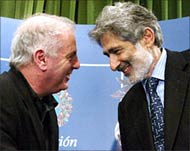West’s greatest Palestinian advocate
Edward Said was the most passionate and eloquent defender of the Palestinian cause in the most pro-Israeli country in the world, the United States.

After an 11-year battle with leukaemia, Said passed away aged 68 in New York on Thursday.
A professor of comparative literature at Colombia University, Said straddled a huge range of subjects, from opera and politics to the media and classical music.
But he will ultimately be remembered as an unstinting critic of Israel and, more surprisingly, of Yasir Arafat’s Palestinian Authority.
This earned him public enemy number one status among America’s Jewish establishment, and the bitter mistrust of Palestinian leaders.
Privileged upbringing
Edward Said was born in Jerusalem in 1935 to a prosperous Christian family.
During his childhood he never wanted for anything, travelling widely in Europe and the Middle East with legions of servants in toe.
While still a schoolboy in Cairo, Said was exiled from his homeland in 1948 when the Israel was established on what was formerly Palestinian land.
A few years later he moved to New York and revelled in the cultural riches and intellectual freedom it offered him, while never forgetting his roots.
|
“The question to be asked is how long can the history of anti-Semitism and the Holocaust be used as a fence to exempt Israel from arguments and sanctions against it for its behaviour towards the Palestinians?” Edward Said |
In a country where popular culture portrayed Arabs and Muslims as fanatical terrorists, Said was a shock to the American system.
His most influential book, Orientalism (1978), claimed the West had manufactured a false image of Arab and Muslim culture to ensure political and cultural hegemony.
Palestinian rights
And he did not see why the horrors of the Holocaust should be exploited to deprive the Palestinians of their rights.
In one of his later books he wrote: “The question to be asked is how long can the history of anti-Semitism and the Holocaust be used as a fence to exempt Israel from arguments and sanctions against it for its behaviour towards the Palestinians?
“How long are we going to deny that the cries of the people of Gaza… are directly connected to the policies of the Israeli government and not to the cries of the victims of Nazism?”
Yet Said also encountered criticism from Palestinians unhappy at his secular opposition to Palestinian Islamic groups, and for promoting negotiations with Israel.
There can be little doubt that Said’s tireless advocacy in the American media opened the way for the Oslo peace process between Israel and the PLO.
Peace process
As the process gained momentum, however, Said adopted an increasingly critical stance and resigned from the Palestinian National Council in 1991.
 |
|
Daniel Barenboim (L) and Said |
Later, when Yasir Arafat signed the Oslo peace accords with Israel, Said criticised the Palestinian leader for “collaborating with military occupation”.
To the end, he remained a thorn in the side of the Palestinian Authority.
It seemed an irony to many that the most distinguished Palestinian exile had become the subject of censorship by his own people.
In his final years, Said continued to be a fierce critic of American and Israeli policy but as his health grew ever more fragile he withdrew from the political fray.
Instead, he channelled his energies into music collaborating with Israeli musician Daniel Barenboim in a production in the West Bank.
Irreplacable
The United States is a country where Palestinian media figures are regularly trounced by Israeli apologists.
Edward Said, however, was a shining exception to this rule.
With his passing, the Palestinian people have lost their greatest and most effective advocate in the West.
He will be almost impossible to replace.